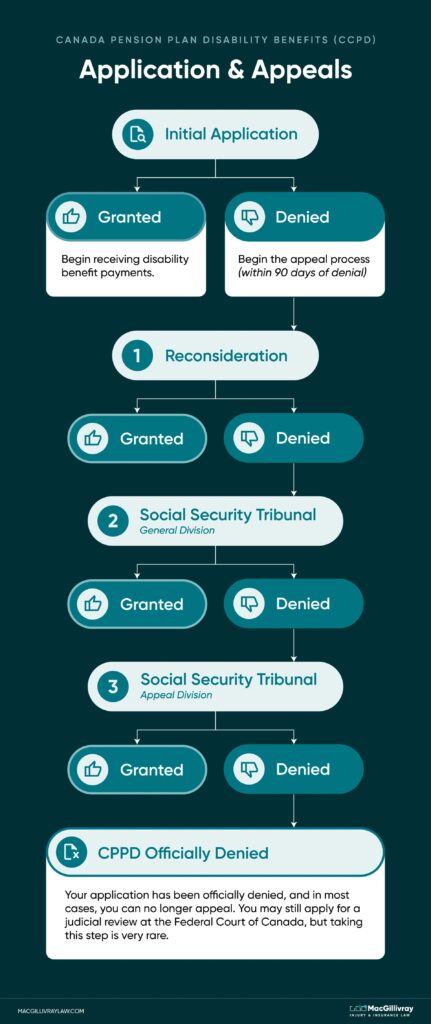



The Canada Pension Plan (CPP) includes disability benefits (CPPD), created by the Canadian Government, to partially replace the income of eligible contributors under 65 who are dealing with a severe and prolonged disability. These benefits are different from what private insurance plans offer and may be applied for even if you are already receiving LTD benefits from a private insurer.
Applying for CPPD benefits can be complex. If your application is denied, don’t be discouraged. An Auditor General’s report in 2015 showed that over half of CPPD applications are denied initially, and that a review of those denials by the Department showed that 1/3 of those denials should have been approved. Our lawyers are here to guide you through the process.
The steps to apply for CPPD benefits may change based on individual situations. To help you navigate the application and appeals process, we’ve created a simple chart. Should you face a denial at any point, our lawyers are ready to offer the support you need.

What qualifies as a “disability” for CPP disability benefits?
The Canada Pension Plan (CPP) defines a “person deemed disabled” as someone with a “severe and prolonged mental or physical disability.” The CPP disability legislation specifies that a “severe” disability refers to any mental or physical impairment that prevents someone from engaging in substantially gainful work, including part-time work. “Prolonged” means a disability that is long-term and indefinite or is likely to result in death.
The most important thing is to ensure you have medical evidence supporting your disability. A disability insurance lawyer can assist you in constructing the strongest possible case.
What contributions make someone eligible for CPPD?
In order to qualify for the Canada Pension Plan (CPP) disability benefit, you need to have made contributions to CPP for the Minimum Qualifying Period (MQP).
The MQP is typically four of the last six years, or three of the last six years if you have contributed to CPP for at least 25 years. The MQP is determined by a specific date, usually December 31st of the last year in which you met the MQP criteria.
The amount of your CPP disability benefit is based on your contributions. Your denial letter will indicate whether you have made sufficient contributions or not. You should provide this information when consulting with a lawyer so they can best evaluate your case.
Your disability must have been deemed severe and prolonged prior to the MQP date.
There are exceptions to the minimum requirements. For instance, individuals who were out of the workforce to raise children or those who were unable to apply due to physical or mental disability may still be eligible.
For further details regarding eligibility, you can refer to the Canada Pension Plan Disability Benefit – Eligibility section on the Government of Canada website.
Why should I apply for CPP disability?
There are several benefits to applying for CPP disability benefits:
- Financial Assistance: CPP disability benefits provide financial support to individuals who are unable to work due to a severe and prolonged disability. These benefits can help cover essential expenses and medical costs during the period of disability.
- Long-Term Security: By applying for CPP disability benefits, you establish a stable and ongoing source of income, ensuring long-term financial stability while you are unable to work consistently.
- Enhanced Coverage: CPP disability benefits can supplement other disability coverage you may have, such as long-term disability insurance, providing additional financial protection and peace of mind.
- Support for Health and Rehabilitation: When you apply for CPP disability benefits, you gain access to resources and services aimed at supporting your health and rehabilitation. This can include medical treatments, vocational rehabilitation programs, and other forms of assistance to improve your well-being and potential for future employment, if applicable.
- Future Considerations: Applying for CPP disability benefits establishes a record of your disability, which can be valuable for potential future claims or eligibility for other programs and services related to disability support.
How much will I receive on CPP?
The Canada Pension Plan (CPP) disability benefit payment amounts vary based on individual circumstances. However, in 2023:
- The minimum monthly benefit payment is $558.74.
- The maximum monthly benefit payment is $1,538.67.
- The average monthly amount is $1,132.55.
The specific amount of your CPP disability benefit is determined by your contributions. For more detailed information regarding the potential benefit amount you may receive, please refer to the Canada Pension Plan Disability Benefit – How much could you receive section on the Government of Canada website.
Additionally, CPP disability benefits are subject to taxation. This means that the benefit is considered income for tax purposes.
Why was my CPP application denied?
Some common reasons CPP disability benefit applications are denied include:
- Insufficient Medical Evidence: A lack of medical documentation to prove a severe and prolonged disability can lead to denial. Comprehensive medical reports, diagnoses, treatment records, and other relevant data are vital to the claim.
- Failure to Meet Eligibility Criteria: If you don’t satisfy specific criteria such as the minimum contribution period or the definition of a severe and prolonged disability, the application may be rejected.
- Incomplete Application: Missing information or documents can result in denial. Accuracy in completing all sections of the application and including all required documentation is crucial.
- Discrepancies or Inconsistencies: Inaccurate or inconsistent information can cast doubt on the validity of the claim, leading to rejection. Ensuring accuracy and consistency throughout the application is key.
- Failure to Cooperate: Unresponsiveness or failure to provide additional information during the review process can result in denial. Prompt and complete responses to any requests from the CPP authorities are essential.
If your CPP application has been denied, review the denial letter and seek professional advice from a lawyer who specializes in CPP disability claims. They can help evaluate your case, identify the reasons for the denial, and guide you through the appeal process if applicable.
What can I do if my CPP application was denied?
If your application for Canada Pension Plan (CPP) disability benefits is denied, you have the option to request a reconsideration. During this process, Service Canada staff members who were not involved in the initial benefits claim will carefully review your application, considering any new information or documentation you provide. If the reconsideration decision is also unfavorable, you can then proceed to appeal the decision to the Social Security Tribunal – General Division, which will involve a hearing. The next level of appeal is at the Social Security Trubunal – Appeal Division. In rare cases, if the application is still turned down by the Social Security Tribunal, denied applicants may have the opportunity to further appeal to the Federal Court or Federal Court of Appeal.
Are CPPD benefits retroactive?
Under CPPD rules, you can only receive retroactive benefits for up to 15 months before the date you first apply for benefits. That means the most you can get in retroactive benefits is 15 months’ worth from your application date, regardless of when you became disabled. If you apply and the decision takes six months, you could be eligible for up to 21 months of back pay, assuming there’s enough proof of your disability. If you’ve been disabled for five years but only apply today, you can only get benefits for the last 15 months.
However, there’s an additional catch: there’s a mandatory 4-month waiting period from the time you apply for benefits to the time you begin receiving them, during which you receive no benefits. So, even in a circumstance where you applied for and were disabled for 15 months before your application was approved, you would only receive 11 months of retroactive benefits.
Are CPPD benefits taxed?
CPP disability benefits are subject to tax, but these taxes aren’t automatically taken out of your monthly payments. If you want federal income tax deductions, you’ll need to provide the correct tax forms.
Each year, you’ll get a tax slip—either a T4 (for Canadian residents) or an NR4 (for those outside Canada)—showing what you received in CPP disability benefits. You must include this slip when you file your taxes to report your benefits accurately and meet your tax obligations.
If you’ve received retroactive benefits, you can choose to tax them in the years they were due, not the year you received them. This can help reduce the tax impact.
Are CPP disability benefits deducted from your injury settlement?
Yes, if you’ve suffered a disabling injury in a car accident, your CPP disability benefits will be subtracted from any amount that you receive for missed time from work. Many long-term disability policies also offset CPP disability benefits from the amount owed under the LTD policy.
This rule is designed to ensure fair compensation without overpayment. After a car accident, you can apply for CPP disability benefits to replace income lost from not being able to work. The Supreme Court of Canada has emphasized that compensation should be adequate but not excessive.
The core issue is whether future CPP disability payments should be subtracted from future loss of income awards. If not, and you continue to receive both, you could end up being over-compensated.
Traditionally, CPP disability benefits were guided by the collateral benefits rule, meaning that insurance benefits shouldn’t be subtracted from civil claim remedies. This seemed logical for CPP disability benefits since you would have been paying the premiums and should benefit accordingly. But current law in Nova Scotia allows future CPP disability payments to be subtracted from awards for future loss of income following a car accident.
Why do I need a lawyer for my CPPD appeal?
A lawyer can be critical with CPP disability because in these cases back and forth settlement negotiations do not happen. You either end up with your CPP disability benefits or you end up with nothing. An experienced CPP disability lawyer can help guide you in terms of documentation that may be required to help overturn your denial and support you throughout the appeal process. Furthermore, the lawyer will help you prepare for the hearing, which for many can be a stressful process. After all, you want to ensure you have the best possible chance at success moving forward.
Request a
Free Consultation
If you would like to learn your legal options at no obligation, contact us today to set up a free consultation.
